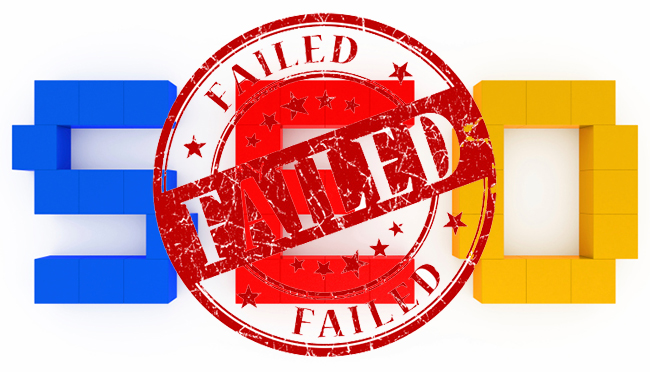Why do so Many SEO Campaigns Fail
Because search engine optimization (SEO) campaigns contain so many moving parts, they frequently fall short of expectations, and sometimes have to be written off as a complete failure. SEO campaigns fail for a variety of reasons, the most common of which can be traced to unrealistic expectations, decisions made that are not based on hard data, or an insufficient budget to achieve the targeted goals.
When SEO campaigns fail, you not only risk losing your investment in time and money, you may incur search engine penalties that will affect your ability to achieve good ranking positions in the search results for many months to come, assuming your website is even able to make a full recovery.
Contrary to what some marketing gurus may have told you, there is simply no such thing as guaranteed SEO success. The next best thing to a guarantee is to recognize the most common problems that lead to SEO campaign failure, and to ask the right questions of your staff or outside agency that will help keep your efforts focused and on track.
Do You Have Realistic Goals?
Trying to rank for every single product and related keywords with one SEO campaign is a fairly common mistake. Concentrate your resources on your most important product until you attain a favorable ranking position that generates a steady flow of targeted traffic, then repeat your efforts for another product.
Is Your Timeframe and Budget Sufficient to Realize Your Goals?
Someone once said that failure to budget sufficient money to execute an advertising campaign is like buying an airline ticket for a journey half-way to Europe; you spend money but not enough to get anywhere. Much like advertising, SEO require both time and money to do the job properly and achieve results. Make sure that you have the resources necessary to achieve your SEO goals.
Is Your Campaign Optimized for the Correct Keywords?
Extensive keyword research is necessary to make sure that you’re targeting the correct keywords that will attract the right type of buyer traffic. Choosing the wrong keywords will doom your campaign to failure from the start. Use a keyword tool that properly analyzes and interprets keyword data, and confirm your findings by comparing your list with the keywords used by competitive sites that are beating you in the rankings.
Are You Attracting the Right Traffic?
Assuming that you have done your keyword research properly, you still might not be attracting the right sort of traffic to your offer. An easy way to test for this is to analyze your site’s bounce rate for organic traffic. A high bounce rate usually indicates that your content is not delivering on what visitors are expecting to see based on your results listing snippet.
Is Your Website Properly Designed for Optimal Conversions?
A cluttered, confusing website that makes navigation to your core offer difficult for visitors is one of the leading causes for high bounce rates and low conversions.
- Is your website outdated or poorly designed?
- Is your website user-friendly across a variety of desktop and mobile devices?
- Are visitors delivered to a specific landing page with a clear call-to-action based on their search query?
Is Your Content Useful and Relevant?
The whole idea behind a search query is to get questions answered and problems solved. Is your content providing genuinely useful information to visitors or simply aimed at pushing your target keywords out in front of the search engines?
Are You Tracking the Right Analytics to Help You Tweak and Improve Your Efforts?
Two of the best tools for tracking website performance are free to use and available from Google: Google Analytics and Google Webmaster Tools. Add them to your arsenal, and be sure to look at all of the data provided to help you understand how your SEO efforts are contributing to website traffic and conversions.










